Related Research Articles
Earthbag construction is an inexpensive building method using mostly local soil to create structures which are both strong and can be quickly built.
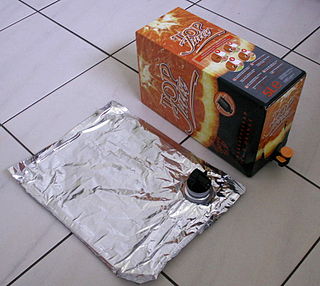
A bag-in-box or BiB is a container for the storage and transportation of liquids. It consists of a strong bladder, usually made of several layers of metallised film or other plastics, seated inside a corrugated fiberboard box.

A punching bag is a sturdy bag designed to be repeatedly punched. A punching bag is usually cylindrical, and filled with various materials of suitable hardness.

Plastic shopping bags, carrier bags, or plastic grocery bags are a type of plastic bag used as shopping bags and made from various kinds of plastic. In use by consumers worldwide since the 1960s, these bags are sometimes called single-use bags, referring to carrying items from a store to a home. However, it is rare for bags to be worn out after single use and in the past some retailers incentivised customers to reuse 'single use' bags by offering loyalty points to those doing so. Even after they are no longer used for shopping reuse for storage or trash is common, and modern plastic shopping bags are increasingly recyclable or compostable. In recent decades, numerous countries have introduced legislation restricting the sale of plastic bags, in a bid to reduce littering and plastic pollution.
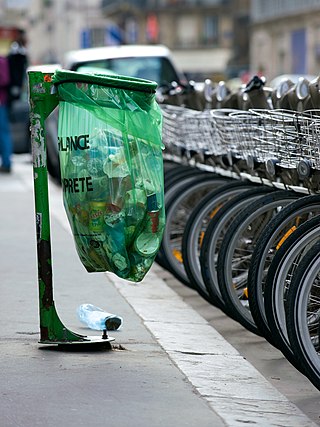
A plastic bag, poly bag, or pouch is a type of container made of thin, flexible, plastic film, nonwoven fabric, or plastic textile. Plastic bags are used for containing and transporting goods such as foods, produce, powders, ice, magazines, chemicals, and waste. It is a common form of packaging.

A bin bag, rubbish bag, garbage bag, bin liner, trash bag or refuse sack is a disposable bag used to contain solid waste. Such bags are useful to line the insides of waste containers to prevent the insides of the receptacle from becoming coated in waste material. Most bags today are made out of plastic, and are typically black, white, or green in color.

Lewis Galoob Toys, Inc., was a toy company headquartered in South San Francisco, California. They are perhaps best known for creating Micro Machines, which accounted for 50% of its sales in 1989, and distributing the Game Genie in the United States.
Hefty is an American brand of household products such as trash bags and trash cans, disposable tableware, children's disposable tableware, slider closure food storage and freezer bags, plastic storage bins, and disposable cookware. Originally a Mobil product, the brand has been owned by Reynolds Consumer Products since 2010.

A paper bag is a bag made of paper, usually kraft paper. Paper bags can be made either with virgin or recycled fibres to meet customers’ demands. Paper bags are commonly used as shopping carrier bags and for packaging of some consumer goods. They carry a wide range of products from groceries, glass bottles, clothing, books, toiletries, electronics and various other goods and can also function as means of transport in day-to-day activities.

A field ration is a type of prepackaged or canned military ration. Field rations are distinguished from garrison rations by virtue of being designed for minimal preparation in the field, as well as for long shelf life. They contain canned, vacuum-sealed, pre-cooked, or freeze-dried foods, powdered beverage mixes or concentrated food bars. Many field rations contain meat as one of their main courses, but countries such as the United States offer vegetarian options as well. A WWI term, the "iron ration" is a soldier's dry emergency rations. The term MRE is sometimes used synonymously with field ration but it more accurately describes a specific type from the United States. Most armed forces in the world today now field some form of pre-packaged combat ration, often suitably tailored to meet national or regional cuisines.
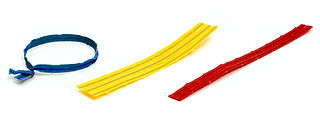
A twist tie is a fastener made of one or more metal wires encased in a thin strip of paper or plastic, in such a way that it can bend and retain its shape. Wireless polymeric twist ties have also been developed.
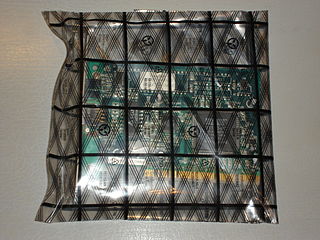
An antistatic bag is a bag used for storing electronic components, which are prone to damage caused by electrostatic discharge (ESD).
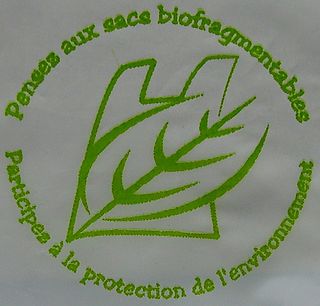
Biodegradable bags are bags that are capable of being decomposed by bacteria or other living organisms.

A bag is a common tool in the form of a non-rigid container. The use of bags predates recorded history, with the earliest bags being lengths of animal skin, cotton, or woven plant fibers, folded up at the edges and secured in that shape with strings of the same material.

Trashy Bags Africa is a commercial venture in Accra, Ghana, which turns plastic waste into reusable shopping bags, fashion accessories, school supplies, and other products.
There are various issues of waste management in Thailand, including excessive plastic use, industrial waste, among others.
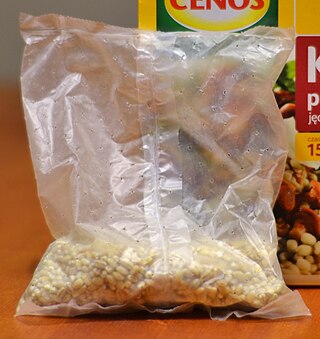
Boil-in-bags are a form of packaged food products in which bagged food is heated or cooked in boiling water. Plastic bags can be solid and impermeable for holding frozen foods; alternatively, bags can be porous or perforated to allow boiling water into the bag.

Package handles, or carriers, are used to help people use packaging. They are designed to simplify and to improve the ergonomics of lifting and carrying packages. Handles on consumer packages add convenience and help facilitate use and pouring. The effect of handles on package material costs and the packaging line efficiencies are also critical. A handle can be defined as “an accessory attached to a container or part for the purpose of holding or carrying.” Sometimes a handle can be used to hang a package for dispensing or use.
Fatu Kekula is a Liberian woman who was a nursing student during the Ebola virus epidemic in Liberia. Four of her family members became ill and could not access medical care in a hospital. She improvised a "trash bag method" that would allow her to care for her family members without becoming ill herself. Three of her family members survived the epidemic, and Kekula herself did not contract the virus. The trash bag method has been recognized as a relatively simple and accessible way for people to protect themselves in an epidemic if they cannot get treatment in a hospital.
Isatou Ceesay is a Gambian activist and social entrepreneur, popularly referred to as the Queen of Recycling. She initiated a recycling movement called One Plastic Bag in the Gambia. Through this movement, she educated women in The Gambia to recycle plastic waste into sellable products that earned them income.
References
- ↑ "'Wow, can I have one?' Toy Fair sets the stage for Christmas season". The Index-Journal. 11 February 1992. p. 15. Retrieved November 11, 2014– via Newspapers.com.

- ↑ STA Galoob's Trash Bag Bunch
- ↑ "POPKORN.nu - Lekcenter".
- ↑ "WildEye - Trash Bag Bunch". ReBots (in Danish). Retrieved 2020-02-05.